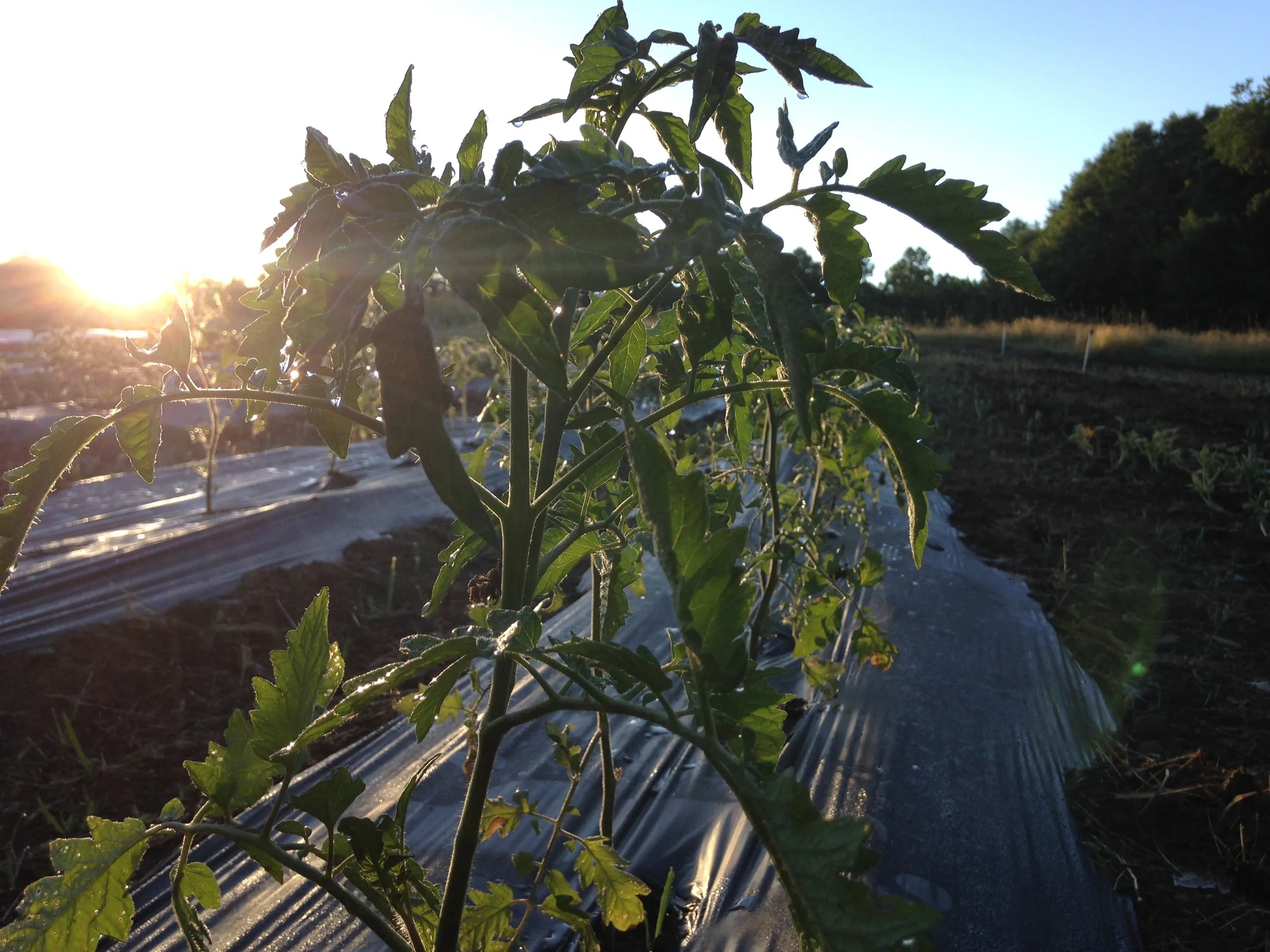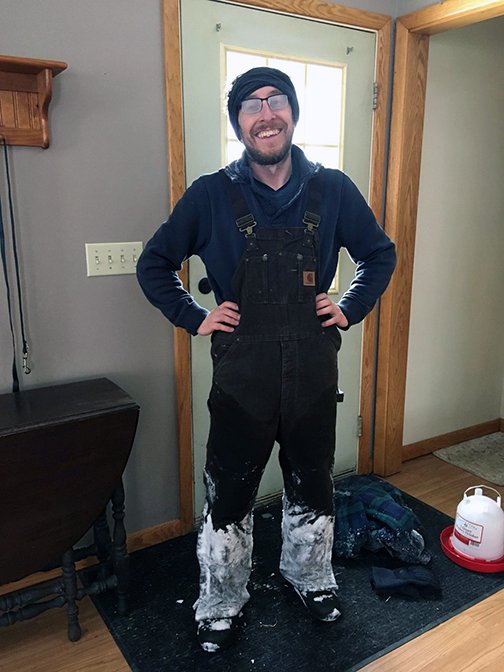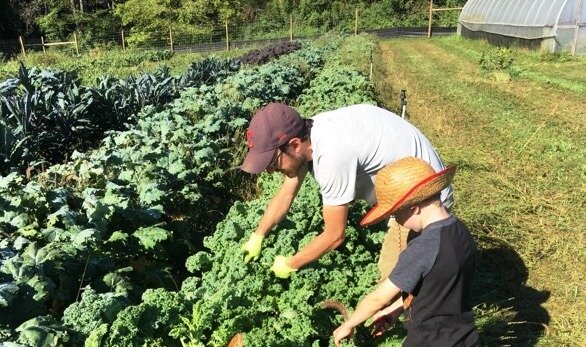From my pillow, the woods behind the house is visible. In winter, my gaze threads the spaces between branches, able to dart a short distance until the lattice of limbs becomes a gray wall. But when I woke on Monday, the snow had stacked thick on the branches, halting my view at the first row of treetops, much like in summer.
About a foot of snow had piled on overnight. Just a day before the storm, the ground and air were bone dry. On a walk up to the farm, the wind sent leaves clattering across the road and rushing through the woods. It felt like a late-autumn day. Now, the woods was heavy. The snow weighed everything down. The branches of the thorn apple looked like fat, white, spiked dinosaur tails.
Before the storm, Jason hauled firewood from the backyard stacks to our basement. In a less chaotic year, we would have stored wood under our porch, just a few steps from the house. But this year, we’re stuck playing catch up all winter. Jason cut and hauled enough wood in from the forest, but he has to split it every few weeks, and then we take turns dragging it to the house in either a cart or sled. One of Jason’s oft-quoted sayings is, “Firewood is so nice, it warms you twice.” First, the chopping warms you, then the flames. This year, we could say it warms us thrice, or four times, or more. Chop it. Haul it. Stack it. Split it. Drag it to the house. Stack it in the basement. Carry it up the darned stairs!
If you’ve never experienced wood stove heat, this may not sound worth it. But wood heat is a different kind of warm. There’s something about having those orange flames glowing in the Buck Stove in the middle of our humble dwelling. For more than a million years, we’ve fed the flames and they’ve nourished us with heat. That bond is alive and well as I sit in my chair and type, listening to clicks and crackles and pops coming from the stove. In winter, the low grumble of the fire is always in the background here. The peak of luxury is crossing my legs at the ankles, and feeling waves of heat wash against the bottoms of my feet.
Before bed, we load up the stove, but it usually burns out at some point in the early morning. This makes for a chilly house before breakfast. With a mild winter thus far, the lowest temperature in the house was 53 degrees in the main living area. Back in the bedrooms, it’s cooler. If I wake up, and my sinuses feel near froze, the only relief is to tuck my forehead in the warm bowl Jason’s shoulder blades make when he sleeps on his side.
The chill is temporary. We dress in layers, and there are enough morning chores to warm us up. Layers and movement, the two best remedies for cold. Within a few hours, the temperature rises to the mid 60s. By evening, it’s in the 70s, thanks to old Buck.
Working full time and farming made finding time to tend to firewood difficult for Jason. Now that he’s home, one of his goals is to get a year or two ahead with firewood gathering. Time, we trust, will be our greatest asset in this new life.
Not a bad way to get some exercise.
After the big snowfall, Silas and I went sled riding with Luna. Our house sits on a knoll that’s steep enough to cut a decent track. Earlier this month, Jason and Silas managed to sled ride with just a dusting on this knoll as I watched from the window. When you’re a wife, but also a mother to a young son, there’s usually at least one person trying to show off for you much of the time. Silas would look over his shoulder and smile at me on his way down the hill. Jason would at least wait until he reached the bottom to catch my eye and grin. Admittedly, there is something still quite thrilling about having him show off for me after more than 20 years together.
While Silas and I zipped down this same hill, Jason used a shop broom to sweep snow off the little propagation high tunnel, which crumples like a squashed bug under heavy snow. After brushing it off, he gets underneath and pushes up from inside until it pops back up.
Afterward, Jason strapped on snowshoes and trudged uphill to the farm to sweep off the kale tunnel.
Just in from sweeping snow from the tunnels. Lots of snow, lots of sweat.
After lunch, we trekked up the road to sled ride at Grandma and Grandpa’s cabin, which sits atop a long slope. At times, we were playing in the middle of a blizzard, with snow tumbling down and blowing all around.
While Jason and Silas kept sledding, I enjoyed the rare opportunity to swing on a swing and leap off without shooting thunderbolts up both my ankles, thanks to foot-deep white padding.
We’re making the most of all this snow, Silas especially, of course. Is there any greater test of woman’s endurance than the repeated bundling and unbundling of a child in snow clothes?
One year, we made a family pact to sled ride every day that we could. The rule was, a Ruggiero had to go down a hill at least once, provided there was enough snow. We set impressive streaks, going weeks at at a time without missing a day. With Jason at work, it was mostly Silas and I who carried out the pact. Watching them both from my snowy swing made this a merry blizzard.
Friends who know about trees: What is this lavender stripe?
ADJUSTING TO SELF-EMPLOYMENT
We’re in our first month as self-employed people. In the weeks leading up to Jason’s final day with his old employer (and his final paycheck), I spent a lot of time thinking about how to best handle the money flow in our house now.
Ever since starting (and completing) our debt-free journey, I’ve had my consistent system, which was based on the arrival of regular earnings. Now, our income comes from two primary sources (Spark Community Capital and the farm), and we’re no longer on the standard twice-a-month paycheck schedule that we’ve known our entire adult lives.
I needed to come up with a new system to ensure we always had enough money in the hopper. The last thing I want is to have to sound the alarm each month. We do not want to scramble. The whole point of our low cost of living is to enjoy a life free from money struggle.
As part of our new system, we opened another checking account. This account serves as a holding pen for the next month’s bills, so we’re always a month ahead no matter what. With our new system, we should always have enough funds for the current month’s bills, and the upcoming month. This lets us divert “extra” money to savings, family fun, and charity, etc. The idea is that we’ll always have time to replenish the family coffers and avoid lean times.
We also brought back our sinking funds account. Sinking funds are money that we set aside every month to pay for upcoming (usually large expenses), such as car and home insurance (paid in full, not monthly), and spring and fall property taxes. That fund was key to helping us get out of debt. It kept us from dealing with any expensive “surprises” throughout the year. (They weren’t really surprises, of course, but sometimes those larger bills sneak up on you.)
I’m convinced that the key to making our self-employment work is laying out a monthly budget, and sticking to it. We don’t see budgets as restrictive. For us, they’re a way of maintaining peace of mind in our home.
Our current monthly personal budget generally looks like this. (Note: Spark pays its own bills, and the farm pays for itself, as well. The list below is for our household, and doesn’t contain costs such as taxes.)
FEBRUARY 2022
— House-related payments: $620
— Internet: $100 … Our internet out here in the sticks is so lousy, that we started tracking every day it’s patchy, and our internet speed. Our line is likely cracked somewhere, and Verizon has apparently no intention of ever digging it up and fixing it. I requested a sort of peace agreement with the company: they’ll keep providing sub par internet, and we’ll only pay for sub par internet. They offered to give me a monthly discount for a year, and a one-time $65 discount for lost service in January. I’m going to keep tracking, and keep calling, so we’ll see what happens. We’re also exploring other internet options because it is a hinderance to our businesses. Normally, our bill for a landline and internet is about $100 a month. With the discounts, our February bill should actually be about $28.)
— Electric: $200 … This varies, depending on the time of year. During the farm season, we power grow lights and the walk-in cooler, and our bill tops out around $200. This time of year, our bill is around $130, but I typically budget $200 anyway out of habit.
— Groceries: $400 per month … During the winter, we go to the grocery store twice a month.
— Gasoline: $90 … We budgeted for three tanks of gas, given that Jason no longer has a commute.
TOTAL FOR BILLS, GROCERIES, AND GAS: $1,410
Note: We’re being extremely cautious with spending in this first year, as we figure out how to navigate self-employment. With January going smoothly thus far, I did build some spending money in our February budget for things like birthday gifts and family fun (about $150 total).




